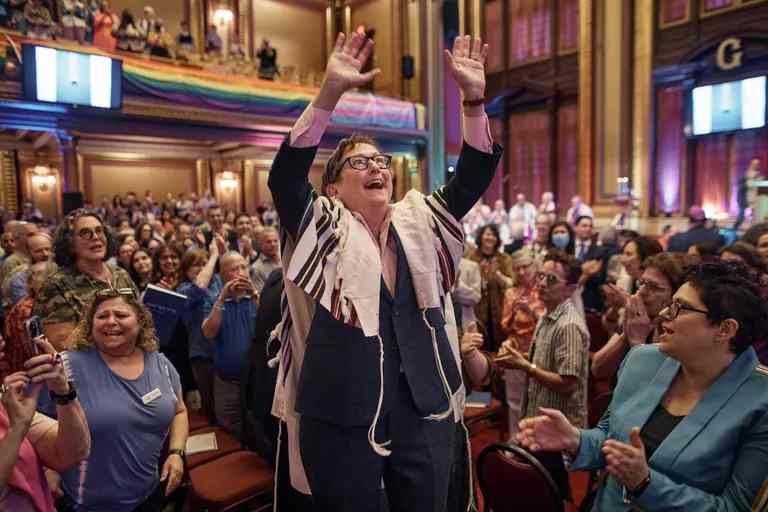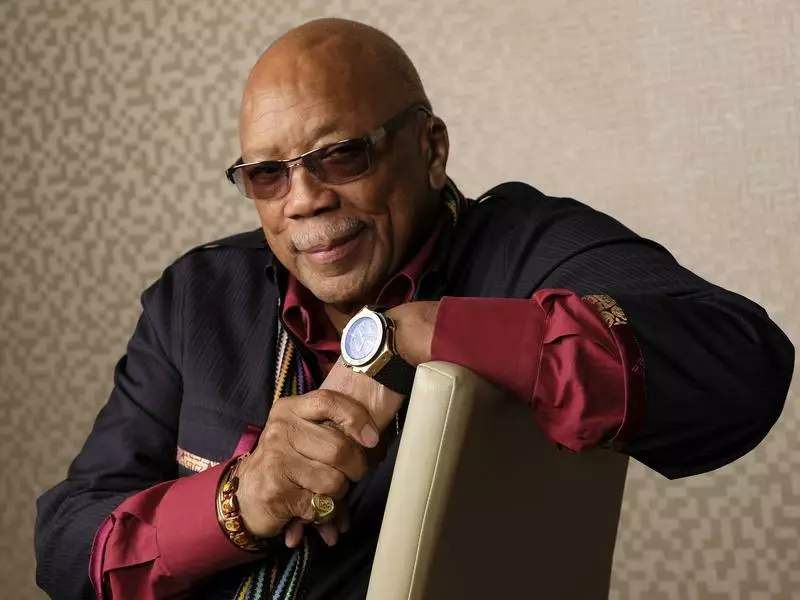After 32 Years As A Progressive Voice For LGBTQ Jews, Rabbi Sharon Kleinbaum Heads Into Retirement
Jul 1, 2024 / GMT+6
Rabbi Sharon Kleinbaum has been actively involved as a leader and advocate for LGBTQ Jews for 32 years. Now, she is retiring from her role or stepping back from active leadership in this capacity. It marks the end of her long tenure and contributions to advocating for LGBTQ rights within the Jewish community.
More topics for you...This topic continues below.
China reports record $1.2 trillion trade surplus for 2025, defying Trump's tariffs.
For over 30 years, Rabbi Sharon Kleinbaum guided the largest LGBTQ+ synagogue in the U.S. through major events like the AIDS crisis, Matthew Shepard's murder advances in marriage equality, and recent challenges to transgender rights. Now, she's retiring from her role at New York City's Congregation Beit Simchat Torah. Her departure raises questions about the synagogue's future identity after being shaped by her leadership for decades.
As Rabbi Sharon Kleinbaum retires, the LGBTQ+ rights movement faces challenges: same-sex marriage is legal nationwide, but conservative efforts restrict transgender healthcare, LGBTQ+ education, and drag performances. Reflecting on her career, Kleinbaum expressed gratitude for using her talents in line with her beliefs. Now, she feels it's time to pass the torch to a new generation.
Rabbi Sharon Kleinbaum, 65, led a boldly progressive Judaism at her NYC synagogue, embraced by her community and liberal leaders. During Trump's presidency, she reached out to Muslims and established an immigration clinic aiding LGBTQ+ refugees seeking asylum in the U.S., viewing it as a religious duty. For Kleinbaum, this work was as vital as leading Friday night services.
Congregation Beit Simchat Torah (CBST), with around 1,000 paying members, attracts about 4,000 Jews annually for its High Holy Day services at New York's Jacob Javits Convention Center. The congregation includes notable LGBTQ+ figures and media personalities like Edie Windsor, Andy Cohen, and Joan Rivers. Rabbi Sharon Kleinbaum's wife is Randi Weingarten, leader of the nation's largest teachers union.
Appointed in 1992, Rabbi Sharon Kleinbaum's early years at CBST were marked by the burying of congregation members, many lost to AIDS. The need for a full-time rabbi for pastoral care prompted CBST's decision to hire her. She even conducted a funeral for a member of the committee that selected her.
During the 1990s, gay and lesbian visibility grew, but so did setbacks like the federal Defense of Marriage Act, which restricted marriage to heterosexual couples.
William Hibsher, a CBST member since Rabbi Sharon Kleinbaum's appointment in the early 1990s, recalls her initial years as a time of intense community support amidst the AIDS crisis, which claimed a third of its members. Inspired by Kleinbaum's dedication, Hibsher, initially not observant, found solace and support from her during his partner's battle with AIDS. He became deeply involved with CBST, serving on its board and aiding in fundraising for its current location on West 30th Street.
In 2013, after New York legalized same-sex marriage, Rabbi Sharon Kleinbaum officiated outdoor weddings across from the marriage bureau. In 2014, she married a couple who had meticulously planned their ceremony in a former Broadway theater.
Kleinbaum hasn't detailed her retirement plans but hinted at staying active in social justice or Democratic politics. CBST honored her with the title "senior rabbi emerita" as she stepped down, signifying her ongoing connection, though she will no longer occupy the CBST bimah.
Despite ideological differences, Rabbi Sharon Kleinbaum has collaborated with those who might oppose her views on issues like religious freedom and human rights. Appointed by President Joe Biden to the U.S. Commission on International Religious Freedom, she worked alongside Tony Perkins, leader of the Family Research Council, which opposes LGBTQ+ rights.
Fred Davie, a friend of Rabbi Sharon Kleinbaum and an administrator at Union Theological Seminary, noted her ability to find common ground despite strong ideological differences. Kleinbaum served two terms on the USCIRF, ending her first term in early 2020 to focus on her congregation during the COVID-19 pandemic, a challenge reminiscent of the AIDS crisis for her and CBST.
Reflecting on the challenges of the COVID-19 pandemic, Rabbi Sharon Kleinbaum drew parallels to the AIDS crisis, noting similarities in feelings of isolation and fear. For CBST, her departure raises uncertainty about the synagogue's future without her. Many members, who have been with Kleinbaum from the start, wonder what comes next. While Jason Klein was named the new chief rabbi starting July 1, there's a consensus among members that Kleinbaum's presence will be hard to replace.
A year ago, Rabbi Sharon Kleinbaum announced her departure from CBST, sparking surprised reactions at Yom Kippur services last September. Her second-to-last Shabbat service on June 21 was packed, with New York Attorney General Letitia James speaking passionately about the safe and free space Kleinbaum created at the synagogue. As the congregation faces the future without her, there's a reflection on the need for an LGBTQ+ synagogue in 2024 and beyond.







